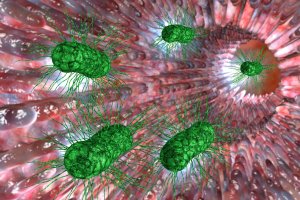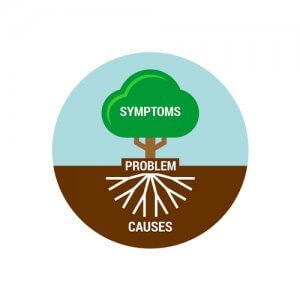What is IBS (Irritable Bowel Syndrome)
IBS is one of the most common digestive health conditions impacting approximately fifty million people in the US alone. The symptoms of IBS vary but may include:
- Cramping
- Abdominal pain
- Gas
- Bloating
- Flatulence
- Distention
- Diarrhea
- Constipation
- Reflux
- Nausea
- Fatigue
- Brain fog
Between 40 to 75 percent of IBS patients test positive for SIBO (Small Intestinal Bacterial Overgrowth) via lactulose breath testing, though the findings vary from study to study. SIBO is a form of dysbiosis, the unbalanced growth of intestinal microbiota.
Although SIBO is a well-known form of dysbiosis involved in IBS, there are others identified in IBS patients. Here are several possible forms of dysbiosis that may be present in IBS patients.
SIBO (small intestinal bacterial overgrowth): greater than 104 bacteria per mL in the small intestine, causing symptoms and potentially damaging the small intestine mucosal surface.
- SIFO (small intestinal fungal overgrowth): an overgrowth of fungi (most often Candida albicans) in the small intestine leading to symptoms and potentially damaging the mucosal surface.
- IMO (intestinal methanogen overgrowth): an overgrowth of a unique type of non-bacterial microbe called Archaea (most often Methanobrevibacter smithii), which combines hydrogen produced by bacteria with carbon dioxide to form methane. IMO can occur in both the small and large intestine, causing various symptoms, including slow transit constipation.
- LIBO (large intestinal bacterial overgrowth): Studies on IBS patients using smart pill technology indicate IBS patients often have bacterial overgrow in the early part of the large bowel, causing symptoms. This may come as a surprise since we already have lots of bacteria in this part of the intestine, but the data is clear even if the term LIBO has yet to catch on.
- Other forms of dysbiosis in IBS: Numerous studies have identified specific patterns of dysbiosis where certain bacterial strains differ in their abundance or diversity. This can be reviewed and analyzed based on comprehensive stool testing leading to actionable interventions.
Standard Treatments for IBS
Current IBS treatments include:
- Supplements
- Laxatives
- Anti-diarrhea medications
- Fiber
- Antacids
- Pain relievers
- Motility agents and a variety of prescription medications
Despite the number of medications, there is a distinct lack of evidence of their efficacy for IBS. According to Dr. William Chey, U. Michigan Health System, a survey of 1500 gastroenterologists showed that “91% of GIs felt that diet was as good or better than medical therapies for IBS”.
Dietary Intervention for IBS
Dietary advice for IBS varies and includes trigger food diets, low FODMAP and specific carb diets. While these approaches have provided some relief, none of these diets limit all types of fermentable carbohydrates that can promote dysbiosis. Also, these diet approaches don’t include behavioral and underlying cause analysis guidelines.
Our Integrative and Natural Approach to IBS
Dr. Norm’s Focus for IBS
His focus is on the root cause analysis, why IBS is occurring in your specific case. In addition, he will discuss your current diet, eating behaviors and preferences, medications, and supplements and provide an extensive evaluation of his findings along with detailed written recommendations.
His goal is to address the underlying issues that are specific to your case instead of masking your symptoms. Another goal is to match your diet to your digestive abilities so that you are efficiently digesting and absorbing essential nutrients. This will support recovery from various forms of dysbiosis. Based on your deficiencies and root cause analysis, specific dietary supplements may be recommended.
3 Pillar Approach
Dr. Norm uses the following three-pillar approach in his consultation process:
Identifying and addressing underlying or contributing causes that are specific to your case
- Science-based dietary intervention aimed at understanding your digestive capabilities and optimizing digestion and absorption
- Science-based gut-friendly behaviors and practices as well as supplements to optimize digestion and minimize malabsorption
1. Identifying and Addressing Underlying Causes
Dr. Norm uses science-based risk factor questions to either rule in or out many possible underlying causes. He reviews and analyzes a variety of test results, including but not limited to endoscopy, colonoscopy, blood tests, SIBO tests, comprehensive stool tests, etc.
He may also recommend additional testing to derive meaningful interventions if necessary. Depending upon your specific underlying cause(s), some interventions may involve pharmaceutical or other medical procedures that require you to speak with your primary care doctor or gastroenterologist.
2. Dietary Intervention
While accommodating your dietary preferences and practices, Dr. Norm uses the Fast Tract Diet principles and various other dietary approaches and techniques. He focuses on all three food groups, including carbohydrates, proteins, and fats, to aid better digestion and minimize malabsorption.
As part of the dietary intervention, Dr. Norm audits a list of your dietary supplements to ensure that they are helping you instead of harming you. He may also recommend new or additional dietary supplements based on your specific deficiencies or restorative support.
Aside from addressing IBS / dysbiosis, other digestive and general health issues and addressing weight loss or weight gain are part of the process.
3. Gut-Friendly Behaviors and Practices
Although certain behaviors and practices are critical for better digestion and minimizing malabsorption, these do not get much attention. And this is the missing piece. Diligently incorporating the science-based “gut-friendly behaviors and practices” Dr. Norm outlines, you could expand your foods faster and easier.
How to make an appointment
Phone
+ 1 (844) 495-1151 US. Our office hours are from Monday to Friday from 8:30 am to 5 pm Eastern Time.
Online Form
Disclaimer
Dr. Norm is a consulting microbiologist and not a licensed medical practitioner. He will provide you with detailed reports, notes, links for peer-reviewed journals, and additional information and resources after each appointment, which you can share with your own doctor(s).
 SIBO (small intestinal bacterial overgrowth): greater than 104 bacteria per mL in the small intestine, causing symptoms and potentially damaging the small intestine mucosal surface.
SIBO (small intestinal bacterial overgrowth): greater than 104 bacteria per mL in the small intestine, causing symptoms and potentially damaging the small intestine mucosal surface. Identifying and addressing underlying or contributing causes that are specific to your case
Identifying and addressing underlying or contributing causes that are specific to your case